-
 Request a quote
Request a quote -
 Resource Library
Resource Library -
 Micron size guide
Micron size guideApplication Recommended
Sizing ( microns)Comments Cooling Tower Bleed-off / Blowd 5-55 Closed loop filtration 5-55 Tower Basin Cleaning / Sweeper Jet 5-55 Cartridge replacement 2-55 Protection of Heat exchangers 5-55 Consult with manufacturer Invasive Species 40-70 For larva removal Membrane Protection 70-300 Coal Ash 20-50 depends on process treatment train
Municipal
Municipalities treat a wide range of water quality conditions to meet their drinking water, wastewater or reclaim water requirements. PEP Filters and our affiliated companies have served the municipal market around the globe for nearly five decades. We encourage you to investigate further why PEP Filters is the filter of choice for thousands of municipalities. PEP Filters also manufactures a wide variety of filters that are NSF-61-G, NSF-419 and Title 22 certified.
-
+
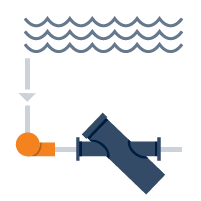
Intake Water Filtration
Intake filters are designed to do the heavy lifting of large or fine solids removal from an incoming water stream so that other polishing post filtration technologies can operate more efficiently and at less cost. Intake water can come from the city, municipality, river, lake or well.

Intake Water Filtration
-
+
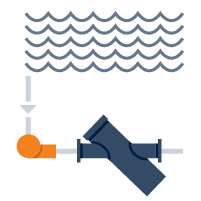
Seawater Intake Protection
Protecting critical equipment from sea water solids and biology is critical to the performance of today’s offshore platforms, desalination systems and power plants. Many of the applications that utilize sea water in their make up process incorporate PEP Filters as their membrane pre-treatment filter of choice. PEP Filters has a rich history of providing membrane protection. We encourage you to reach out to PEP Filters to learn more about our capabilities.

Seawater Intake Protection
-
+
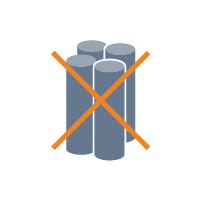
Cartridge Replacement
Cartridge filters are the razor blade business to the water industry. The capital cost for a cartridge filter system is relatively inexpensive from a capital cost point of view compared to other filtration options. That low-cost filtration system, however, does not look as good as it did when it was new several years down the road.
The operational costs of cartridge replacement, system downtime, the labor to change out the replacement cartridges and disposal costs will far exceed the cost of the initial investment and perceived savings one thinks they are receiving.
But wait just a minute. What if a properly designed automatic self-cleaning PEP Filtration system could provide the same or better performance as a disposable cartridge filtration system and save you money in a short period of time? A PEP Filter will automatically backflush and clean itself without the need to replace cartridges. Matter of fact, many customers install a PEP Filter ahead of their cartridge filters so that the PEP Filter actually removes most of the dirt load prior to the filter thus greatly extending the life of the disposal filter.

Cartridge Replacement
-
+
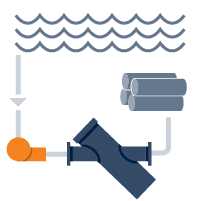
Membrane Protection
Membrane systems whether it be MF, UF or RO do the heavy lifting when it comes to producing quality water. Each system is expensive to purchase, operate and maintain. That is why more OEMs rely on PEP Filters and our other subsidiary companies around the globe to provide the vital pre-treatment to protect their membrane systems from fouling and maximizing their uptime performance. Whether it be for saltwater or freshwater protection, you can count on PEP Filters to deliver the best membrane protection in the industry.

Membrane Protection
-
+
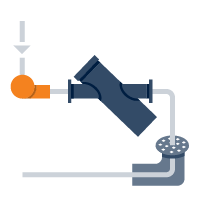
Wastewater Filtration
Wastewater treatment takes place at the backend of the plant. It usually involves cleaning up the waste streams from multiple sources like the Intake, Process and Cooling areas of a plant. Depending on the location of the plant there may be a variety of regulatory discharge limits that have to be met before
the wastewater can be released from the plant. PEP Filters has a complete line of automatic self-cleaning filtration equipment to help facilities meet their discharge limits.

Wastewater Filtration
-
+
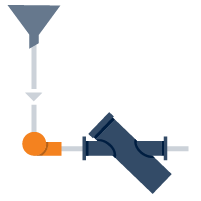
Reclaim Recycle
Water is a finite and valuable resource. Companies invest a significant amount of money to filter it, move it around and shape it into their product needs. It only makes sense that more wastewater is cleaned up and reused throughout any commercial, industrial, municipal or energy facility.

Reclaim Recycle
-
+
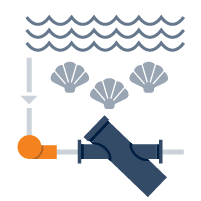
Invasive Species Protection
Over the last decade PEP Filters has experienced strong demand in the removal of invasive species from intake water systems. Invasive species can be made up of mussels, bacteria, plants, and other organic matter. Most companies are interested in the removal of quagga mussels and zebra mussels from their intake systems. Once these mussels make their way into the intake system of any plant or municipality, they quickly multiply and clog vital water streams. This could cost thousands of dollars in downtime and lost opportunity costs that could have been avoided all together with a properly sized PEP Filtration system installed in the front end of any water treatment system.
PEP Filters has an excellent reputation for preventing invasive species from entering one’s intake system. PEP Filters’ self-cleaning automatic filters are able remove larva from spreading throughout a water treatment system. Once the larva is removed, you can rest assured that you have taken significant steps from preventing the growth of quagga and zebra mussels from entering your plant’s water treatment system.

Invasive Species Protection
-
+
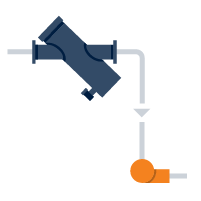
Pump Seal Protection
A good pump is designed to operate for many years. Unfortunately, pumps frequently come out of service due to product leakage from mechanical seal failure.
Contact seals commonly used on pumps wear at the point of contact or groove the shaft, rendering them ineffective in a short period of time. This allows lubrication loss and contamination ingress into the bearing housing. The resulting bearing damage causes axial movement and shaft deflection, which in turns causes the mechanical seal to fail. The end result is catastrophic bearing failure.
A properly designed PEP Filtration system installed prior to the pump will provide protection to the seal. As a general rule of thumb, PEP Filters recommends that a filtration level from 100-200 micron will provide the necessary level of protection to the pump. PEP recommends that one consults with their pump manufacturer to determine the proper filtration degree to provide pump seal protection.

Pump Seal Protection









